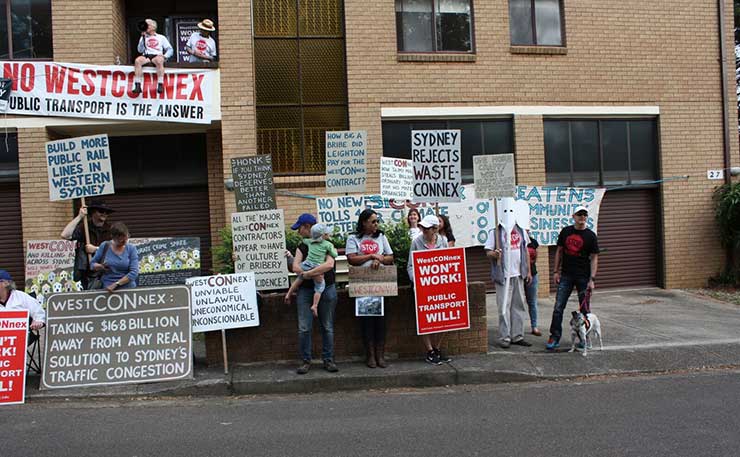For most people working in Australian universities, crazy concepts like ‘science and ethics’ matter. Which begs the question why the largest university superannuation fund invests in companies which seek to promote precisely the opposite. Dr George Morgan explains.
So here’s an ethical dilemma: Transurban is the Australian company that recently added WestConnex to its global portfolio of toll roads, when the NSW government awarded it 51% ownership of Sydney’s new stretch of tar. The company’s largest shareholder is UniSuper, the superannuation fund where most academics keep their retirement savings.
Academic scientists drew the world’s attention to the problem of climate change, and other scholars – experts in cities, transport and planning – showed that new roads almost always encourage more car use and fossil fuel consumption. Universities are still places of independent scholarship where colleagues can do research that would never be funded in the R&D departments of BP or General Motors.
New roads may initially improve traffic flows, but the snarls soon reappear, in the same places or elsewhere. They encourage developers to build houses too far from stations and bus routes, where people have to rely on cars to do everything that can’t be done in the neighbourhood: shop, work, play sport, visit friends.
It is true that Australian governments are trying to consolidate our cities, approving apartment construction near public transport hubs. But they also continue to allow fringe greenfield developments that make cities less sustainable. Poor urban design is a major reason why it appears unlikely Australia will meet global emission targets.
Westconnex has faced one of the most vociferous urban environmental campaigns in Sydney’s history. Its opponents ask the perfectly reasonable questions: why are we building roads when many other cities are pulling them up? Why don’t we invest the money in public transport instead? But this campaign has not cut through. The roads lobby is powerful and car commuters generally welcome anything that appears to shorten travel times.

Politicians speak of new roads in the same breath as new schools, stations and hospitals. It’s all infrastructure, they tell us, and we should be thankful for it. Never mind the fact that the precious urban infrastructure of Sydney Park is being sacrificed at the altar of God Car. Progress is progress.
A few weeks ago, I was surprised and appalled to read of Unisuper’s Transurban exposure in Elizabeth Farrelly’s Herald column. Like many Australians I hadn’t paid much attention to superannuation. At some stage I selected UniSuper’s ‘Sustainable Balanced’ option assuming that my money would support some good environmentally sound enterprises. I’d never thought to look into what the fund deemed sustainable.
But the other day I did. In the ‘sustainable’ basket were companies including James Hardie, Macquarie Bank and Rio Tinto. And there, among the highest holdings is Transurban, a company whose website proudly claims its operations are carbon neutral and which counts among its directors a member of the NSW Climate Change Council. The portfolio also contains a couple of what appear to be ‘greenwash’ investments (Ecolab?). However, much of what UniSuper deems sustainable, I would not.
It is difficult to find investment alternatives, Transurban features in most of the other investment options available to UniSuper members. The same companies crop up in many of these options, however they are badged. And it is futile to elect to put your super into ‘Cash’. This just means that you are effectively allowing banks/financial institutions to invest your money and reap the returns while paying you minimal returns in the form of interest.
The UniSuper board contains academic union and university staff representatives, and a Vice Chancellor. These people should be asking searching ethical questions about investment priorities of a fund that, in the past has invested in a company responsible for running offshore detention centres (though no longer, I understand). But apparently, the need to maximise members’ returns is paramount. Fiduciary duty trumps the duty of care to the planet and its people.
So, is there a thirst for ethical investments? Universities are filled with academics who believe that addressing climate change is one of the principal moral and political challenges of our generation. Yet many of those people have retirement savings in instruments that fund environmental vandalism. Some are no doubt oblivious to this, as I was.
I am in my late 50s and while a modicum of financial comfort in retirement is important, so too is the state of the world my grandchildren will inherit. So, I’ve decided to switch my super over to ‘Global Environmental Opportunities’. From now on I will be funding Japanese railways, rather than Australian roads.
Donate To New Matilda
New Matilda is a small, independent media outlet. We survive through reader contributions, and never losing a lawsuit. If you got something from this article, giving something back helps us to continue speaking truth to power. Every little bit counts.




